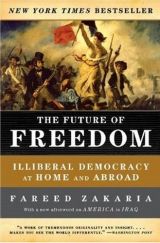


|
|
The Future of Freedom [UNABRIDGED] (Audio CD)
by Fareed Zakaria
| Category:
political |
| Market price: ¥ 570.00
MSL price:
¥ 498.00
[ Shop incentives ]
|
| Stock:
Pre-order item, lead time 3-7 weeks upon payment [ COD term does not apply to pre-order items ] |
|
|
MSL rating:
 Good for Gifts Good for Gifts |
| If you want us to help you with the right titles you're looking for, or to make reading recommendations based on your needs, please contact our consultants. |

Detail |

Author |

Description |

Excerpt |

Reviews |
|
|
|
Author: Fareed Zakaria
Publisher: Blackstone Audiobooks; Unabridged edition
Pub. in: September, 2003
ISBN: 0786190396
Pages: 320
Measurements: 6.6 x 6.5 x 1.2 inches
Origin of product: USA
Order code: BB00133
Other information: 978-0786190393
|
|
Rate this product:
|
|
Fareed Zakaria is the editor of Newsweek International, a regular columnist for that magazine’s domestic edition, and a political analyst for ABC News. He received a B.A. from Yale and a Ph.D. from Harvard. He lives in New York City.
|
|
From publisher
More democracy means more freedom. Or does it? American democracy is, in many people’s minds, the model for the rest of the world. Fareed Zakaria points out that the American form of democracy is one of the least democratic in use today.
|
| View all 5 comments |
Peter Jennings (MSL quote), USA
<2008-09-23 00:00>
A very thoughtful and intelligent book...for those who would make American policy.
|
Bernard Lewis (MSL quote), USA
<2008-09-23 00:00>
At once provocative and illuminating. |
From Library Journal (MSL quote), USA
<2008-09-23 00:00>
Newsweek International's editor exposes the down side of democracy, i.e., the assumption that what's popular is right.
|
Bryce Christensen (MSL quote), USA
<2008-09-23 00:00>
The spread of democracy threatens freedom? So argues journalist Zakaria in a provocative critique of political trends fast democratizing the entire globe. In numerous newly democratic countries, Zakaria sees elections serving not as a guarantee of liberty but rather as a legitimization of tyranny. Liberty, he argues, depends less on the will of the majority than it does on institutional safeguards for the rights of minorities. Lacking such safeguards, rude democracy has swept countries such as Venezuela, Russia, and the Central African Republic toward illiberal authoritarianism. Even in the U.S., Zakaria warns, the slide away from constitutional republicanism toward reflexive populism portends civic malaise. More broadly, Zakaria worries that a democratized American culture that panders to popular taste even in its museums, courtrooms, and churches may be losing the cultural resources necessary to sustain a regime of liberty. Zakaria does express buoyant hopes for a future in which capitalists liberalize international politics-even in China and Iraq-but he also lays out the sobering task of resolving the dilemmas of untrammeled democracy. |
View all 5 comments |
|
|
|
|